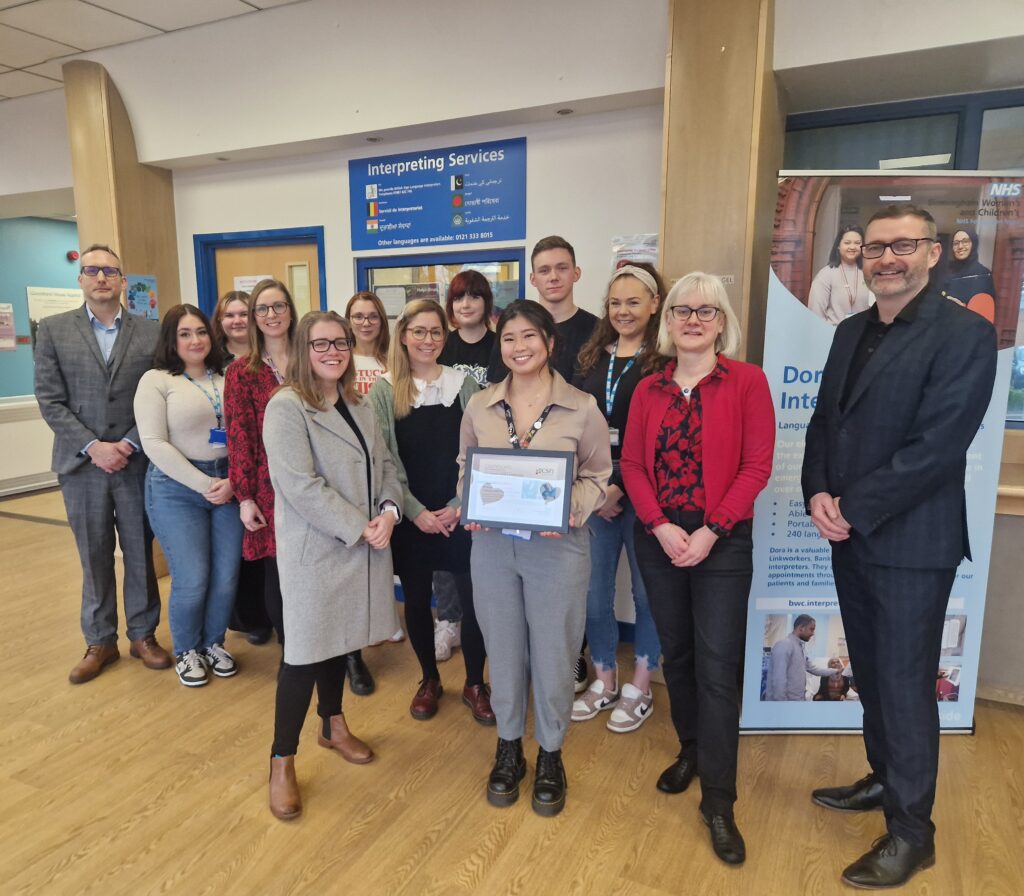
GLH team members celebrate their award win
The West Midlands Regional Genetics Laboratory (WMRGL), based at Birmingham Women’s and Children’s NHS Foundation Trust, has been awarded Employer of the Year by CSR Scientific Training for their outstanding work on apprenticeships.
The award, given in February 2024 during National Apprenticeships week, celebrates the laboratory’s commitment to apprenticeships with the awarding body noting the laboratory’s particular commitment to trainees and ongoing plans to embed the apprenticeship programme into the wider department. The programme was recognised for its commitment to inclusivity as well as its academic and pastoral support, and was overall stated to be “Head and shoulders above the rest”.
The WMRGL has a dedicated education and training team which looks after a range of healthcare science training programmes from Level 4 apprenticeship through to PhD level consultant. Together with the Education and Training Lead, Sarah Clinton, the programme was set up by Senior Training Manager, Karen Cooke in 2020. The programme has continued to grow its numbers since inception. Karen stated, “We set this programme up from scratch, with our first apprentices starting in April 2021”.
When asked what sets this apprenticeship apart, the team are clear about others can learn from their approach. Karen told us: “Our focus is on meaningful inclusion of (predominantly) local people. To this end, the interview approach is mostly values-based – we are looking for people whose principles align with our organisation, as opposed to scientific qualifications or specific kinds of past work experience.
“We understand that for some people, undertaking new learning like this can feel like a big step, and we thought about the ways we could make that transition easier for people. One example of this is that we give comprehensive training plans, timetables and handbooks to apprentices from the day they start with us, so that they know what they will be doing for the next two years ahead of time. We know this helps keep people engaged, but it also to gives them confidence that we have a plan for them as we would any valued staff member.
“We also implement a mentoring structure for apprentices where they are paired up with an experienced genetic technologist. This helps with professional role modelling and identity formation, but mentors are also important in supporting the mental wellbeing of our apprentices.
“As a team, we are clear that we are here if an apprentice needs to speak to someone. Most of our trainers and mentors are trained mental health first aiders and we are always happy to speak with people who need support. This was one aspect of our offer which CSR have now shared and we are pleased to see this.”
The programme employs a significant number of people, with the highest number of life sciences apprentices of any NHS organisation. Karen is keen to note that, “Every candidate we have appointed on the programme is there because they were the best candidate. We are very happy with our apprenticeship programmes, and very proud of our trainees.”
Two such individuals are Mollie, 24, and Beth, 23. Both are currently working as apprentices within the Lab and have only positive feedback on their experiences.
Mollie began working in the lab as an intern in January 2023. After six months in this role, she successfully applied for the apprenticeship programme and began in September 2023. She was drawn to genetics specifically due to having Ehlers-Danlos syndrome, an inherited disorder affecting connective tissue.
Mollie is keen to note the encouragement her managers have shown her: “I could not be more supported. Our apprenticeship leads, Karen and Michelle Owen, are amazing – they care about both your physical and mental health.
“They knew about my Ehlers-Danlos syndrome from when I started working at the lab and have been really helpful. I struggled with balancing work and study in my apprenticeship, but they helped me to approach my tutor and find a better balance.”
Beth echoes this sentiment, stating, “The leads, and Karen in particular, are genuinely concerned about how you are as a person. We are supposed to rotate around areas each six months as part of our training plans, but due to an operation I would have struggled with this on one occasion. They adapted things to allow me to stay in the same area as I may be off for a while. They’ve been really understanding and helpful, which just makes life so much easier!”
Beth worked in a number of healthcare settings before securing her apprenticeship at the lab, having worked in roles in a mental health crisis home and within a pharmacy. The pharmacy role increased her interest in the laboratory side of healthcare, and she is thriving in her role at the lab.
Both Mollie and Beth intend to stay in the NHS moving forward. Mollie stated, “We see it as the beginning of a pathway within the NHS. I’m not sure where I want to be yet, but working in different areas gives us exposure to lots of different options”. The apprenticeship programme continues to grow, with its next cohort planned to start in late 2024. With apprenticeships in the NHS offering routes into over 350 careers, it’s clear that successful programmes such as this one will help to build and retain the future workforce of the NHS.
